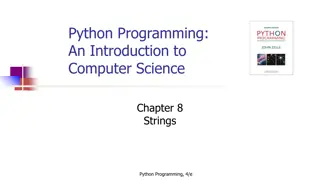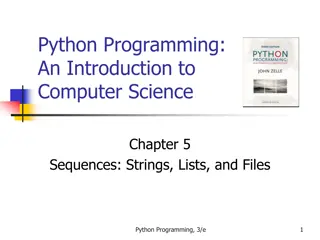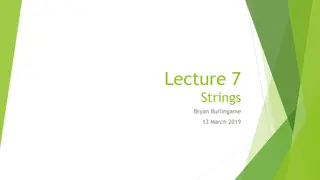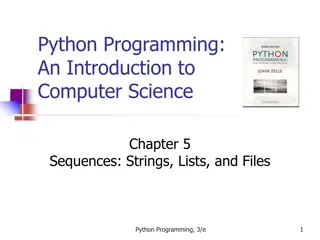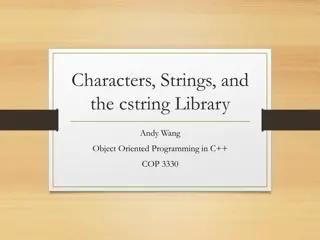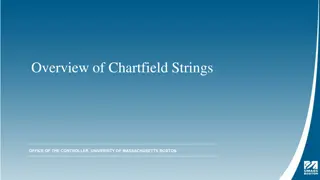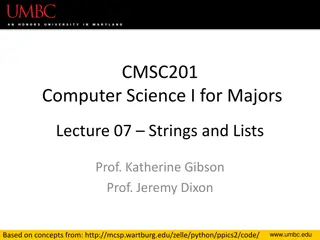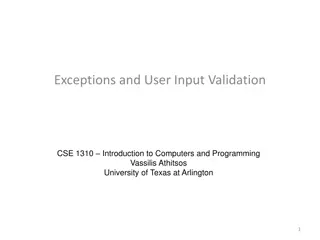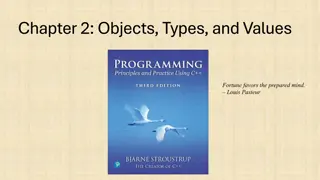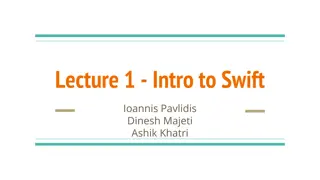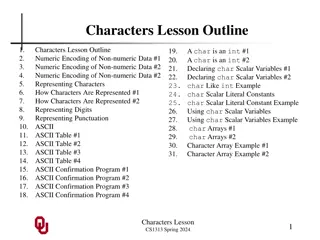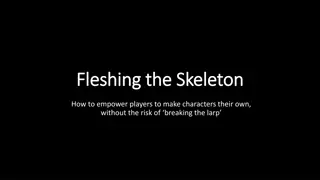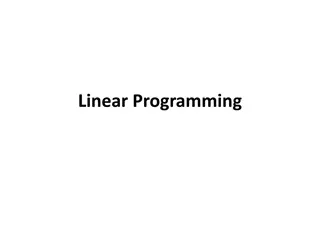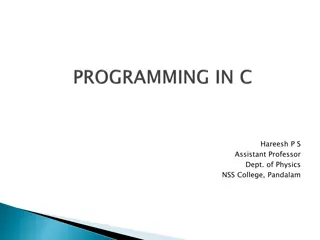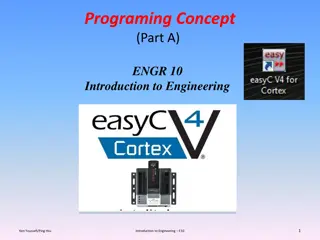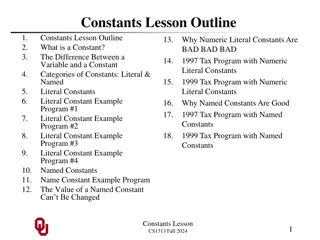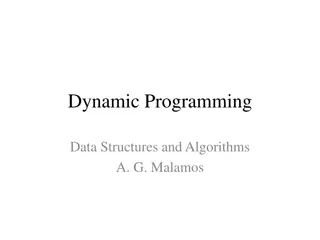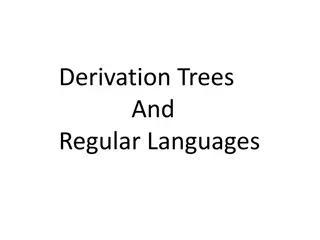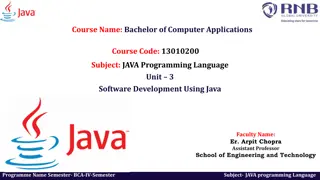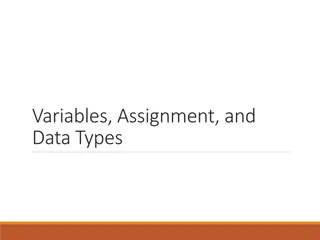Understanding Character Strings in C Programming
Dive into the world of character strings in C programming with topics like string declaration, termination, copying functions, comparisons, and dynamic allocation. Explore how to work with character arrays and pass strings as function arguments for effective programming. Enhance your knowledge through examples and lessons in managing character strings efficiently.
Download Presentation

Please find below an Image/Link to download the presentation.
The content on the website is provided AS IS for your information and personal use only. It may not be sold, licensed, or shared on other websites without obtaining consent from the author. Download presentation by click this link. If you encounter any issues during the download, it is possible that the publisher has removed the file from their server.
E N D
Presentation Transcript
Character Strings Lesson Outline 1. 2. 3. 4. 5. 6. 7. 8. 9. 10. Character String Assignment Example #2 11. #include <string.h> 12. Character String Declaration 13. Character String Terminator 14. How String Printing Really Works #1 15. How String Printing Really Works #2 16. String Copy Function: strcpy 17. strcpy Example 18. String Placeholder 19. String Placeholder Example Character Strings Lesson Outline char Arrays #1 char Arrays #2 Character Array Example #1 Character Array Example #2 Character Strings Character String Terminator Jargon: Sentinel Value Character String Assignment Example #1 20. The strlen Function 21. strlen Function Example 22. Dynamic Allocation of Strings 23. String Dynamic Allocation Example #1 24. String Dynamic Allocation Example #2 25. Passing a String as a Function Argument 26. String Function Argument Example #1 27. String Function Argument Example #2 28. String Function Argument Example #3 29. String Comparisons 30. String Comparison is Case Sensitive 31. String Comparison Example #1 32. String Comparison Example #2 33. String Comparison Example #3 Character Strings Lesson CS1313 Spring 2024 1
char Arrays #1 In C, you can have an array of type char, just as you can have arrays of numeric types: char my_name[12]; We can fill this char array with characters and be able to print them out. Character Strings Lesson CS1313 Spring 2024 2
char Arrays #2 my_name[ 0] = 'H'; my_name[ 1] = 'e'; my_name[ 2] = 'n'; my_name[ 3] = 'r'; my_name[ 4] = 'y'; my_name[ 5] = ' '; my_name[ 6] = 'N'; my_name[ 7] = 'e'; my_name[ 8] = 'e'; my_name[ 9] = 'm'; my_name[10] = 'a'; my_name[11] = 'n'; Is this a good solution? Character Strings Lesson CS1313 Spring 2024 3
Character Array Example #1 #include <stdio.h> int main () { /* main */ const int my_name_length = 12; char my_name[my_name_length]; int index; my_name[ 0] = 'H'; my_name[ 1] = 'e'; my_name[ 2] = 'n'; my_name[ 3] = 'r'; my_name[ 4] = 'y'; my_name[ 5] = ' '; my_name[ 6] = 'N'; my_name[ 7] = 'e'; my_name[ 8] = 'e'; my_name[ 9] = 'm'; my_name[10] = 'a'; my_name[11] = 'n'; printf("My name is "); for (index = 0; index < my_name_length; index++) { printf("%c", my_name[index]); } /* for index */ printf(".\n"); return 0; } /* main */ Character Strings Lesson CS1313 Spring 2024 4
Character Array Example #2 % gcc -o chararray chararray.c % chararray My name is Henry Neeman. This is an improvement, but it s still not an efficient way to assign a sequence of characters to a variable. What we want is a kind of char variable that will be convenient to use for inputting, outputting and using sequences of characters. Character Strings Lesson CS1313 Spring 2024 5
Character Strings A character stringis a sequence of characters with the following properties: it is stored like a char array; it is used like a char scalar (kind of). In C, we declare a character string like so: char my_name[my_name_length+1]; Notice that a character string is declared exactly like a char array; in fact, a character string is a char array. Character Strings Lesson CS1313 Spring 2024 6
Character String Terminator The only difference between a char array and a character string is that the length of the char string is one greater than the number of characters to be stored, and the last character in any C character string is the null character, called NUL, which corresponds to integer value 0: '\0' A null character (integer 0) used to indicate the end of a string is known as a character string terminator. In general, a numeric value that is used to indicate that a particular state has been reached for example, the end of a list is called a sentinelvalue. So, the character string terminator NUL is a sentinel that indicates the end of the string in question. Character Strings Lesson CS1313 Spring 2024 7
Jargon: Sentinel Value A sentinel value is a numeric value a number that means something qualitative, even though it s in a variable whose value is intended to be a number. For example, the individual characters in a character string are actually ASCII numeric values that encode the individual characters, as we saw in the ASCII table. But the string terminator isn t a character as such; it s a value whose purpose is to indicate that the end of the string has been reached. Another example is in weather data. For example, in a 3D array of of wind velocity (expressed in, e.g., km per hour), a value like -99999 might mean no wind velocity measured in this location, for example if that location were inside the rocky interior of a mountain. Character Strings Lesson CS1313 Spring 2024 8
Character String Assignment Example #1 % cat charstrassnbad.c #include <stdio.h> int main () { /* main */ const int my_name_length = 12; const int program_success_code = 0; char my_name[my_name_length + 1]; my_name = "Henry Neeman"; /* <-- DOESN'T WORK! */ printf("My name is %s.\n", my_name); return program_success_code; } /* main */ % gcc -o charstrassnbad charstrassnbad.c charstrassnbad.c: In function main : charstrassnbad.c:8: incompatible types in assignment The version above seems like it should work, but it doesn t! Character Strings Lesson CS1313 Spring 2024 9
Character String Assignment Example #2 % cat charstrassn.c #include <stdio.h> #include <string.h> int main () { /* main */ const int my_name_length = 12; const int program_success_code = 0; char my_name[my_name_length + 1]; strcpy(my_name, "Henry Neeman"); /* <-- WORKS! */ printf("My name is %s.\n", my_name); return program_success_code; } /* main */ % gcc -o charstrassn charstrassn.c % charstrassn My name is Henry Neeman. This version works! Character Strings Lesson CS1313 Spring 2024 10
#include <string.h> When using string functions in C such as strcpy, you MUST add the following preprocessor directive to your C source file, just after the directive for stdio.h, like so: #include <stdio.h> #include <string.h> Character Strings Lesson CS1313 Spring 2024 11
Character String Declaration In C, we declare a character string like so: char my_name[my_name_length+1]; Notice that a character string is declared exactly like a char array; in fact, it is a char array. The only difference in the declaration is that the length of the array of char elements that represents the string is one greater than the length of the string. Character Strings Lesson CS1313 Spring 2024 12
Character String Terminator The last character in any C character string is the null character, called NUL, which corresponds to integer value 0: '\0' Thus, the null character (integer 0) is often referred to as the character string terminator. In general, a numeric value that is used to indicate that a particular state has been reached for example, the end of a list is called a sentinelvalue. So, the character string terminator NUL is a sentinel that indicates the end of the string in question. Character Strings Lesson CS1313 Spring 2024 13
How String Printing Really Works #1 % cat charstrassn.c #include <stdio.h> #include <string.h> int main () { /* main */ const int my_name_length = 12; const int program_success_code = 0; char my_name[my_name_length + 1]; strcpy(my_name, "Henry Neeman"); printf("My name is %s.\n", my_name); return program_success_code; } /* main */ % gcc -o charstrassn charstrassn.c % charstrassn My name is Henry Neeman. The program on the next page behaves identically to this program. Character Strings Lesson CS1313 Spring 2024 14
How String Printing Really Works #2 % cat printstring.c #include <stdio.h> #include <string.h> int main () { /* main */ const int my_name_length = 12; const int program_success_code = 0; char my_name[my_name_length + 1]; int index; strcpy(my_name, "Henry Neeman"); printf("My name is "); index = 0; while (my_name[index] != '\0') { printf("%c", my_name[index]); index++; } /* while (my_name[index] != '\0') */ printf(".\n"); return program_success_code; } /* main */ % gcc -o printstring printstring.c % printstring My name is Henry Neeman. Character Strings Lesson CS1313 Spring 2024 15
String Copy Function: strcpy The C standard library function strcpy copies a character string into a char array. strcpy(my_name, "Henry Neeman"); Notice that you CANNOT SIMPLY ASSIGN ONE STRING TO ANOTHER: /* THIS WON'T WORK! */ my_name = "Henry Neeman"; /* NO! */ Character Strings Lesson CS1313 Spring 2024 16
strcpy Example % cat charstrcpy.c #include <stdio.h> #include <string.h> int main () { /* main */ const int my_name_length = 12; const int program_success_code = 0; char my_name[my_name_length + 1]; char my_name2[my_name_length + 1]; strcpy(my_name, "Henry Neeman"); printf("My name is %s.\n", my_name); strcpy(my_name2, my_name); printf("My name is %s.\n", my_name2); return program_success_code; } /* main */ % gcc -o charstrcpy charstrcpy.c % charstrcpy My name is Henry Neeman. My name is Henry Neeman. Character Strings Lesson CS1313 Spring 2024 17
String Placeholder In a printf statement, the placeholder for a character string is: %s Character Strings Lesson CS1313 Spring 2024 18
String Placeholder Example % cat charstrcpy.c #include <stdio.h> #include <string.h> int main () { /* main */ const int my_name_length = 12; const int program_success_code = 0; char my_name[my_name_length + 1]; char my_name2[my_name_length + 1]; strcpy(my_name, "Henry Neeman"); printf("My name is %s.\n", my_name); strcpy(my_name2, my_name); printf("My name is %s.\n", my_name2); return program_success_code; } /* main */ % gcc -o charstrcpy charstrcpy.c % charstrcpy My name is Henry Neeman. My name is Henry Neeman. Character Strings Lesson CS1313 Spring 2024 19
The strlen Function The C Standard Library function strlen returns the length of the string that is passed to it, EXCLUDING THE STRING TERMINATOR: my_name_length = strlen(my_name); Character Strings Lesson CS1313 Spring 2024 20
strlen Function Example % cat charstrlen.c #include <stdio.h> #include <string.h> int main () { /* main */ printf("strlen(%cHenry Neeman%c) = %d\n", '\042', '\042', strlen("Henry Neeman")); return 0; } /* main */ % gcc -o charstrlen charstrlen.c % charstrlen strlen("Henry Neeman") = 12 Character Strings Lesson CS1313 Spring 2024 21
Dynamic Allocation of Strings You can dynamically allocate the space for a string, just as you can for any other array: my_name = (char*)malloc(sizeof(char) * (my_name_length + 1)); Character Strings Lesson CS1313 Spring 2024 22
String Dynamic Allocation Example #1 % cat charstrdyn.c #include <stdio.h> #include <stdlib.h> #include <string.h> int main () { /* main */ const int program_success_code = 0; const int program_failure_code = -1; char* my_name = (char*)NULL; int my_name_length; Character Strings Lesson CS1313 Spring 2024 23
String Dynamic Allocation Example #2 my_name_length = strlen("Henry Neeman"); my_name = (char*)malloc(sizeof(char) * (my_name_length + 1)); if (my_name == (char*)NULL) { printf("ERROR: can t allocate "); printf("char array my_name.\n"); exit(program_failure_code); } /* if (my_name == (char*)NULL) */ strcpy(my_name, "Henry Neeman"); printf("My name is %s.\n", my_name); free(my_name); my_name = (char*)NULL; return program_success_code; } /* main */ % gcc -o charstrdyn charstrdyn.c % charstrdyn My name is Henry Neeman. Character Strings Lesson CS1313 Spring 2024 24
Passing a String as a Function Argument Passing a string to a function as an argument is just like passing any other kind of array argument, whether statically allocated or dynamically allocated, except that you DON T also need to pass a length argument (because its length is implied by its string terminator): int main () { /* main */ char my_name[my_name_length + 1]; char* my_name2 = (char*)NULL; ... print_a_string(my_name); ... print_a_string(my_name2); ... } /* main */ void print_a_string (char* the_string) Character Strings Lesson CS1313 Spring 2024 25
String Function Argument Example #1 #include <stdio.h> #include <stdlib.h> #include <string.h> int main () { /* main */ const int my_name_length = 12; const int program_success_code = 0; const int program_failure_code = -1; char my_name[my_name_length + 1]; char* my_name2 = (char*)NULL; void print_a_string(char* the_string); Character Strings Lesson CS1313 Spring 2024 26
String Function Argument Example #2 strcpy(my_name, "Henry Neeman"); printf("My name is %s.\n", my_name); print_a_string(my_name); my_name2 = (char*)malloc(sizeof(char) * (strlen(my_name) + 1)); if (my_name2 == (char*)NULL) { printf("ERROR: can t allocate "); printf("char array my_name2.\n"); exit(program_failure_code); } /* if (my_name2 == (char*)NULL) */ strcpy(my_name2, my_name); printf("My name is still %s.\n", my_name); print_a_string(my_name2); free(my_name2); my_name2 = (char*)NULL; return program_success_code; } /* main */ Character Strings Lesson CS1313 Spring 2024 27
String Function Argument Example #3 void print_a_string (char* the_string) { /* print_a_string */ const int program_failure_code = -1; printf("The string that was passed is:\n"); if (the_string == (char*)NULL) { printf("ERROR: can t print a "); printf("non-existent string\n"); printf(" in print_a_string.\n"); exit(program_failure_code); } /* if (the_string == (char*)NULL) */ printf("%s\n", the_string); } /* print_a_string */ % gcc -o charstrpass charstrpass.c % charstrpass My name is Henry Neeman. The string that was passed is: Henry Neeman My name is still Henry Neeman. The string that was passed is: Henry Neeman Character Strings Lesson CS1313 Spring 2024 28
String Comparisons Just as numeric values can be compared, so can string values. However, strings aren t scalars. In C, two strings are defined to be equal if they have the exact same contents. In C, strings are compared using the strcmp function from the C Standard Library. The relational operators CANNOT CANNOT CANNOT be used to compare strings! == != < <= > >= Character Strings Lesson CS1313 Spring 2024 29
String Comparison is Case Sensitive String comparison is case sensitive. Thus, if two strings are identical, except that, in a single character, they differ by case for example, an "H" for one string corresponds to an "h" for the other then they WON T be equal. For example: "Henry" is not equal to "henry" Character Strings Lesson CS1313 Spring 2024 30
String Comparison Example #1 #include <stdio.h> #include <string.h> int main () { /* main */ const int my_name_length = 12; const int program_success_code = 0; char my_name[my_name_length + 1]; char my_name2[my_name_length + 1]; char my_first_name[my_name_length + 1]; char my_first_name_lower[my_name_length + 1]; char my_last_name[my_name_length + 1]; Character Strings Lesson CS1313 Spring 2024 31
String Comparison Example #2 strcpy(my_name, "Henry Neeman"); strcpy(my_name2, my_name); strcpy(my_first_name, "Henry"); strcpy(my_first_name_lower, "henry"); strcpy(my_last_name, "Neeman"); printf("strcmp(%s,%s) = %2d\n", my_name, my_name2, strcmp(my_name, my_name2)); printf("strcmp(%s,%s) = %2d\n", my_first_name, my_first_name_lower, strcmp(my_first_name, my_first_name_lower)); printf("strcmp(%s,%s) = %2d\n", my_last_name, my_first_name, strcmp(my_last_name, my_first_name)); return program_success_code; } /* main */ Character Strings Lesson CS1313 Spring 2024 32
String Comparison Example #3 % gcc -o charstrcmp charstrcmp.c % charstrcmp strcmp(Henry Neeman,Henry Neeman) = 0 strcmp(Henry,henry) = -1 strcmp(Neeman,Henry) = 1 Notice that the return value for strcmp can be interpreted as: zero: the strings are equal negative: the first string is less positive: the first string is greater Character Strings Lesson CS1313 Spring 2024 33



